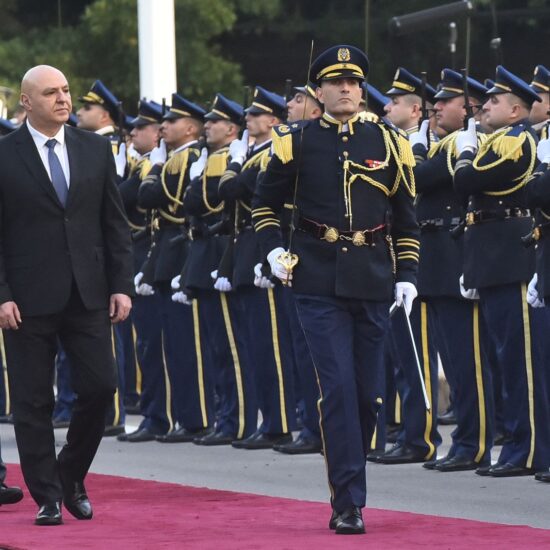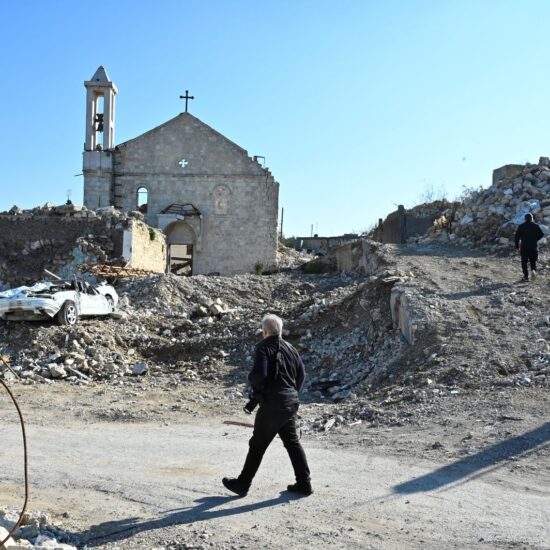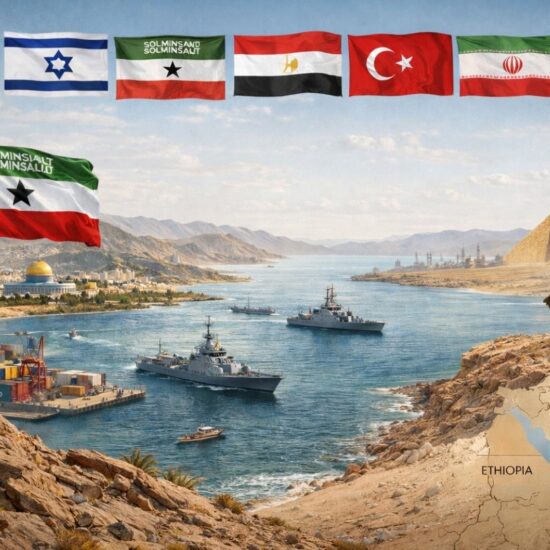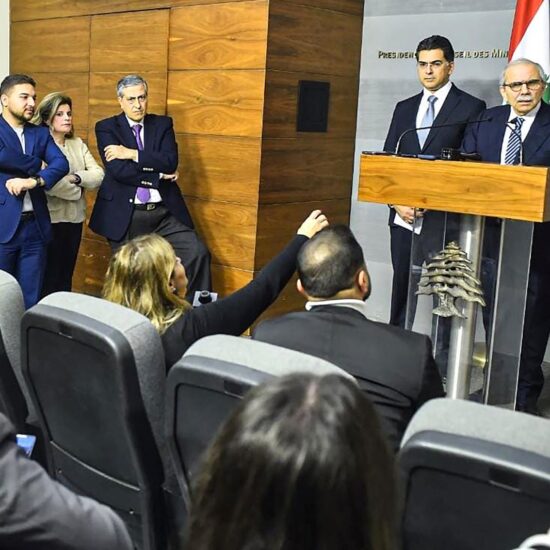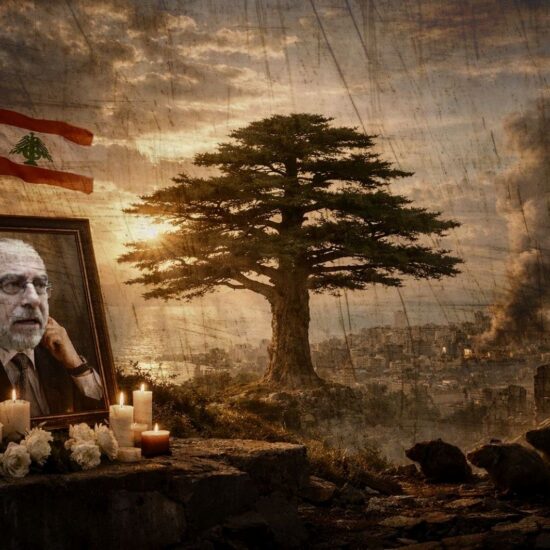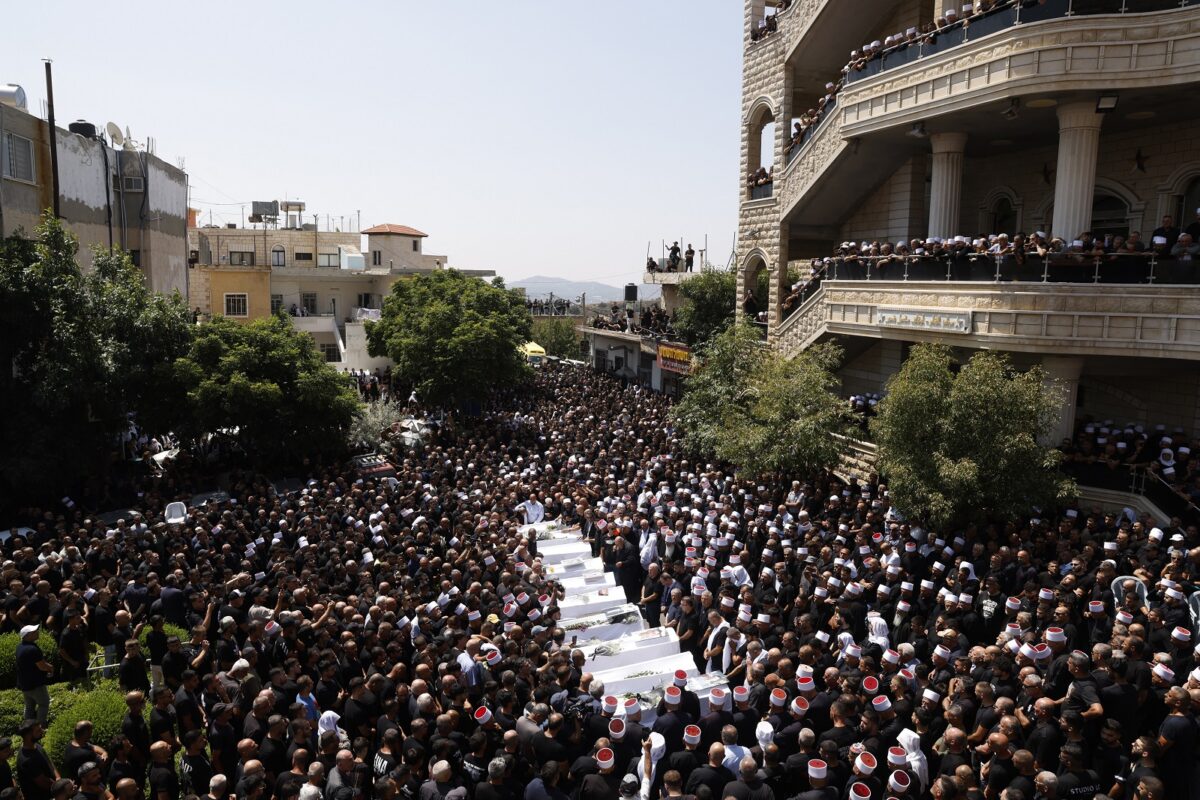
Amid escalating tensions and Israeli airstrikes on Hezbollah targets in Lebanon, following a deadly missile in Masjdal Shams, occupied Golan Heights, flights at Beirut airport were canceled, and diplomatic efforts intensified to prevent a broader conflict, with US officials warning against attacks on major cities like Beirut
On Sunday, Israel announced an increase in combat readiness in the north and threatened Hezbollah with severe consequences after a missile strike in Majdal Shams, an Israeli-occupied Syrian Golan’s village. The missile, which reportedly originated from southern Lebanon, resulted in the deaths of several individuals.
In response to the incident, Israeli Prime Minister Benjamin Netanyahu cut short his trip to the United States and immediately convened a security cabinet meeting upon his return to Israel to discuss a potential response to Hezbollah.
Hezbollah has taken precautionary measures by evacuating significant sites in southern Lebanon and the Bekaa Valley, anticipating possible Israeli retaliation, according to security officials cited by Reuters.
Observers fear this incident could escalate into a full-scale war between Hezbollah and Israel, with potential regional implications.
The missile strike occurred on Saturday evening, hitting a football field in Majdal Shams while children were playing. The village, along with other Arab villages in the vicinity, had not experienced missile attacks since the border skirmishes began on October 8.
The attack resulted in the deaths of 12 children, aged between 10 and 16, and left approximately 30 others injured. All the victims were Druze and held Syrian nationality, with the deceased including three girls and seven boys.
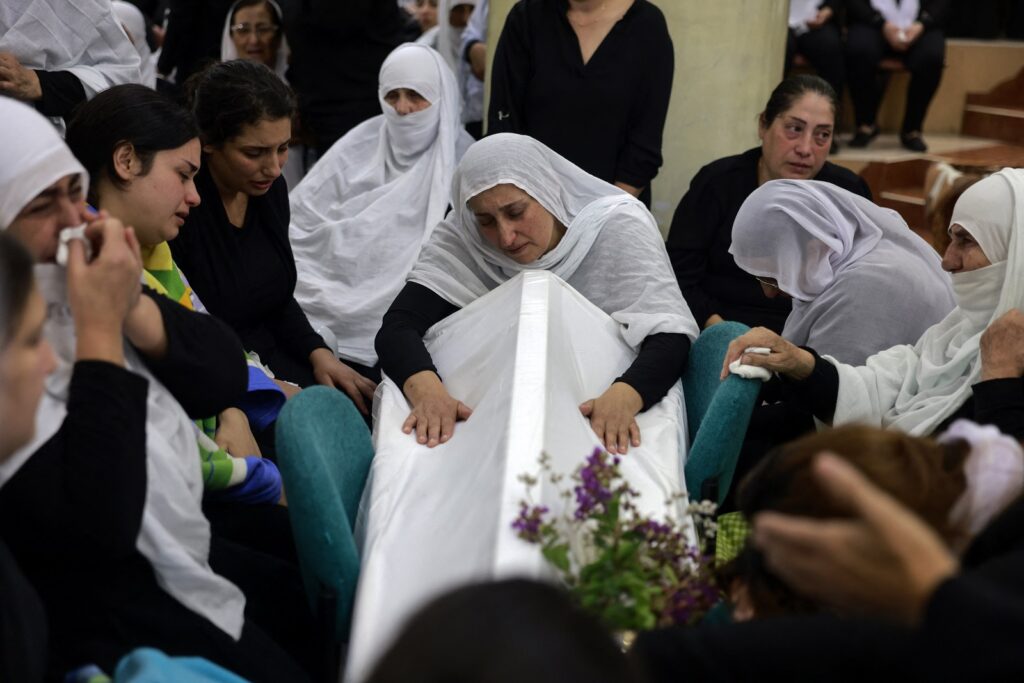
Druze women mourn by a coffin during a funeral of a person killed in a rocket strike from Lebanon a day earlier, that Israeli authorities said killed 12 people including children in the Druze town of Majdal Shams in the Israel-annexed Golan Heights, on July 28, 2024. (Photo by Menahem Kahana / AFP)
The Israeli military identified the missile as an Iranian-made ‘Falaq 1’ with a 53-kilogram warhead, claiming it was launched from southern Lebanon, an area where Hezbollah operates.
Hezbollah has denied any involvement in the attack, dismissing Israeli claims as false. Some analysts have suggested that the missile could have been an errant Israeli interceptor from the Iron Dome defense system, mistakenly landing in Majdal Shams.
Israeli officials have issued strong threats against Hezbollah. Prime Minister Netanyahu warned that Hezbollah would “pay a price like never before.” Foreign Minister Israel Katz stated that Hezbollah’s attack had crossed all red lines and would be met with a proportional response. Defense Minister Yoav Gallant vowed to strike Hezbollah “wherever necessary,” while National Security Minister Itamar Ben-Gvir called for an immediate war against the group.
The White House also attributed the missile attack to Hezbollah, with National Security Council spokeswoman Adrienne Watson stating that the missile was launched from a Hezbollah-controlled area. The US has been in ongoing discussions with Israeli and Lebanese officials since the incident.
During the funeral of the children killed in the attack, several Israeli Ministers faced angry reactions from attendees, who accused them of neglecting the region for months amidst the ongoing conflict with Hamas and intermittent exchanges with Hezbollah. The funeral was attended by various opposition leaders, including Yair Lapid of Yesh Atid and Yair Golan of the Labor Party.
Syrian journalist Hassan Shams, who was a few meters away from the Majdal Shams attack, described the incident live on TV. He reported that a missile fell in the afternoon, and there was a siren just before the missile struck. The reporter expressed skepticism about Hezbollah’s narrative, suggesting that the sirens and the timing of the attack cast doubt on their account.
“In the Golan, we are on Arab Syrian land. We do not have settlers or Israeli army bases, so we refuse any attempts to settle scores or account for political calculations,” he said on live TV. The Syrian Network for Human Rights also accused Hezbollah based on their own images and videos, in addition to analysis
The international community is closely watching the situation, concerned that the conflict may expand into a broader and more destructive war.
In response, flights at Beirut airport have faced cancellations and delays, with Middle East Airlines (MEA) attributing the disruptions to insurance concerns amidst rising tensions between Israel and Hezbollah.
On Monday, Lufthansa announced the suspension of five routes to and from Beirut operated by Swiss International Air Lines, Eurowings, and Lufthansa until July 30 as a precautionary measure.
Additionally, other airlines including SunExpress, AJet (a subsidiary of Turkish Airlines), Aegean Airlines, Ethiopian Airlines, and MEA have also cancelled their flights to Beirut scheduled for Monday, according to Flightradar24.
Lebanese Druze leader Walid Jumblatt warned about Israel’s attempts to incite strife in the region, following its accusation that Hezbollah was behind the shelling of the Druze town of Majdal Shams. Jumblatt, referring to Hezbollah’s denial of involvement in the attack, emphasized that “we renew our alertness to the Israeli enemy’s ongoing efforts to create discord, fragment the region, and target its communities.”
In Lebanon
28/7/2024: Diplomatic sources in Washington and Beirut informed LBCI that an Israeli strike on Lebanon is imminent. Efforts are underway to ensure the strike remains limited in scale and confined to specific locations, avoiding major cities and densely populated areas, including Beirut. This strategy aims to prevent Hezbollah from launching a substantial retaliatory response.
28/7/2024: The Israeli military announced a series of strikes across Lebanon, attributing the actions to Hezbollah’s responsibility for Saturday’s deadly attack in the Israeli-occupied Golan Heights. The Israeli Ministry of Foreign Affairs stated that Hezbollah had crossed a “red line,” raising concerns about potential regional escalation. On Sunday, Israeli jets targeted Hezbollah’s weapons depots and infrastructure in the Bekaa Valley, Shabriha, Burj al-Shemali near Tyre, and the villages of Kfar Kila, Rab el-Thalathine, Khiam, and Tayr Harfa.
28/7/2024: Over the past two days, multiple major parties have been in contact to prevent a large-scale war between Lebanon and Israel. Senior adviser to US President Biden, Amos Hochstein, warned Israeli Defense Minister Yoav Gallant during a phone call on Saturday night that an Israeli attack on Beirut in response to Hezbollah’s alleged strike on Majdal Shams could lead to uncontrollable escalation. This information was reported by Barak Ravid, a political reporter for Axios, citing an Israeli senior official.
27/7/2024: The results of the official high school exams in lebanon have been released. Previously, the media office of the Ministry of Education and Higher Education announced that “the results of the official high school exams for all four tracks would be available around midnight.” They also stated that “the General Directorate of Education, particularly the Department of Official Examinations, is working with its full staff to verify the grades.”
In The Region
More deaths: On July 28, the Civil Defense agency in Gaza reported that an Israeli strike hit tents in a designated safe zone in the southern part of the Palestinian territory, killing at least five people, including a newborn, in Al-Mawasi near Khan Yunis, where many displaced Palestinians have sought refuge. Since Monday, Israeli Forces have been operating in and around Khan Yunis, including parts of the coastal area of Al-Mawasi.
NATO in Jordan: A NATO liaison office is being established in Jordan. At a summit in Washington earlier this month, the Transatlantic Alliance described this development as “a natural progression of the longstanding relationship between NATO and Jordan” and commended Jordan “as a beacon of stability in both regional and global contexts.”
This move has sparked extensive debates among analysts regarding the reasons for opening an office in Amman and its regional and global implications, particularly in light of the Gaza war and other conflicts in the region. However, it is evident that this development highlights the strong emphasis both Jordan and the West place on their security cooperation.
Money-laundering list: Al-Quds Al-Arabi has obtained a new list issued by the Syrian Anti-Money Laundering and Counter-Terrorism Financing Authority. The decision, numbered 3 and dated July 11, 2024, updates the list of individuals and entities accused of money laundering and supporting domestic terrorism.
The updated list includes prominent politicians, political parties, international entities, as well as Arab and foreign religious figures and parliament members. Following this update, the number of individuals involved in financing terrorism and money laundering stands at 597, with 105 entities listed. However, the actual number of organizations, institutions, and associations is 127, as all 24 Turkish associations classified as supporting terrorism are grouped under a single category.
The list features notable figures such as Turkish President Recep Tayyip Erdogan, former Turkish Prime Minister and Foreign Minister Ahmet Davutoglu, former Lebanese Prime Minister and Future Movement leader Saad Hariri, Progressive Socialist Party leader Walid Joumblatt, and Lebanese Forces leader Samir Geagea.
Olympics!: The 2024 Summer Olympic Games officially began in Paris on July 26 with an Opening Ceremony along the Seine River. Over the next 16 days, approximately 10,500 athletes will compete across 32 sports categories, from archery to table tennis.
The Games will feature top competitors aiming for gold, silver, and bronze medals, including stars like Simone Biles, Katie Ledecky, and tennis sensation Coco Gauff, who leads the U.S. team after missing the Tokyo Games due to a COVID-19 positive test. The Olympics will run until the closing ceremony on August 11, attracting spectators from around the world to witness the action.
What We’re Reading
Lost hope for justice: Journalist Dana Hourany discusses a key roundtable on the Lebanese justice system held on July 17, World Day for International Justice, at Station Beirut. Organized by UMAM Documentation and Research, the Lokman Slim Foundation, and Dar Al Jadeed, with the Heinrich Boell Stiftung – Middle East Office, the event gathered legal experts and activists to discuss judicial reform in Lebanon.
The focus was the Lokman Slim Foundation’s report, ‘The Lebanese Judiciary as Misused and Misguided,’ by lawyer Farouk El Moghraby, which addresses systemic issues in the judiciary and recommends reforms. The roundtable explored the impact of these legal dynamics on social and civil society.
The rule of an oligopoly of 14 companies: Journalist Maan Barazy reports on the bleak outlook for Lebanon’s electricity sector amidst ongoing political paralysis and the Ministry of Energy and Water’s reliance on unsustainable solutions that barely sustain Electricity du Liban (EDL).
Efforts to improve electricity production and distribution in Lebanon are thwarted by a political cartel dominating the sector. This cartel includes traditional political families and leading political parties: the Future Movement (Hariri family), the Free Patriotic Movement, the Lebanese Forces, the Progressive Socialist Party (Walid Joumblatt), and the Marada Movement (Suleiman Franjieh). These parties, through their agents or ‘businessmen,’ control the oil market, amassing profits and distributing them to their political patrons who remain behind the scenes.
The economic policy of not having one: Journalist Khalil Gebara highlights how Lebanon’s financial crisis has inadvertently educated citizens in economics and finance, though this learning is influenced by various biases. Recent comments on Electricité du Liban’s (EDL) fuel costs and delays in repair funds for OGERO have fueled debates about the Central Bank’s 5 billion dollars in deposits and the government’s handling of budgetary issues. The 2024 budget, seen as an austerity measure, promised improved services but has not met expectations, with service quality deteriorating despite higher taxes. The Central Bank aims to maintain stability with a fixed exchange rate, which has remained stable at 89,500 USD/LBP for the past year.
Burning again: Journalist Rodayna Raydan reports that Lebanon is struggling to protect its forests amid a surge of devastating fires exacerbated by an exceptional heatwave and Israeli aggression in the southern region. The heatwave, starting in mid-June, has brought unprecedented temperatures and high humidity, creating a sweltering summer.
Lebanon +
In this episode of the ESMA podcast, the hosts talked to Charbel Sleiman about fishing in Lebanon and explored issues such as sustainable practices, the impact of environmental changes on local fisheries, and the challenges facing the fishing industry in the region.



